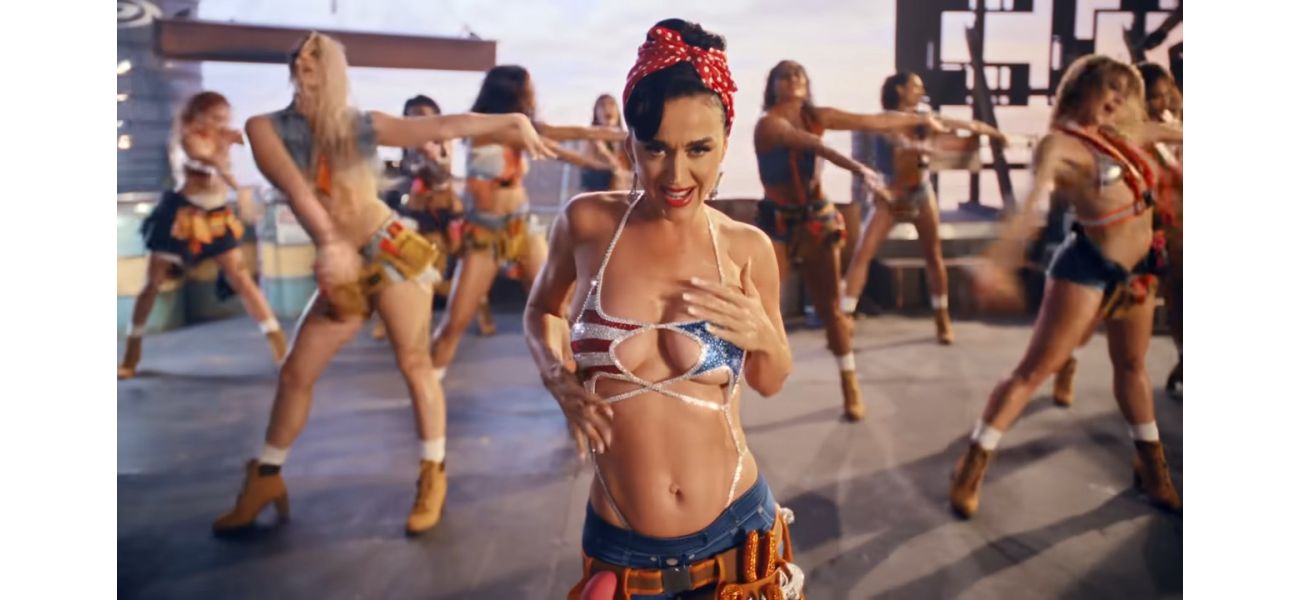Katy Perry's background explains her lack of feminism.
She had an unusual upbringing.
September 20th 2024.

Katy Perry's latest album, 143, released today, has received harsh criticism from music reviewers. Words like "painfully dated", "disastrous", "detached", and "cliché" have been used to describe the album. However, the biggest issue with the album, as evidenced by the lead single "Woman's World", is that it tries too hard to be a feminist anthem.
Katy, whose real name is Katheryn Hudson, has not helped her comeback or her attempt at feminism by working with music producer Dr. Luke, who has been accused of sexual, physical, and emotional abuse by singer Kesha. This has caused Katy to appear out of touch with the current wave of female empowerment in music, exemplified by artists like Chappell Roan, Charli XCX, and Sabrina Carpenter.
This may be due to Katy's upbringing in a very strict, religious household. Born in 1984, while others were embracing the free-love movement of the 1960s, Katy was the child of two Pentecostal Christian ministers who sheltered her from secular music. In a recent podcast interview, Katy revealed that she wasn't even allowed to eat Lucky Charms cereal because "luck" was associated with Lucifer. She also admitted to being on the swim team while wearing a pad because she was not allowed to use tampons.
Reflecting on her childhood in a 2020 interview, Katy described it as a constant barrage of religion, with no room for curiosity or exploration. This strict upbringing could explain her lack of understanding and connection with modern feminism. In addition, Katy has been criticized for cultural appropriation in her past albums, using cornrows, geisha dresses, and Egyptian themes. She has acknowledged her past mistakes, attributing them to a lack of education due to dropping out of school at age 15.
Despite her missteps, Katy's music was more accepted in the early 2010s because it fit with the pop trends of the time. However, her attempt at feminism in her comeback album has received backlash from critics and fans alike. This is likely due to the fact that her past songs, like "I Kissed a Girl" and "Ur So Gay", were criticized for perpetuating damaging stereotypes. While she has since acknowledged her growth and evolution as a person, Katy still faces criticism for her past actions.
In a 2020 interview, Katy discussed the difficulty of growing and evolving in the spotlight, and the lack of empathy and understanding from the public. It seems that, despite her good intentions, Katy has struggled to keep up with the ever-changing landscape of feminism and social progress. This could be attributed to her sheltered upbringing and lack of education, but it's clear that she is still learning and evolving as an artist and a person.
Katy Perry's new album, 143, released today, has received harsh criticism from critics. Many have described it as "painfully dated", "disastrous", "detached", and "cliché". However, there is one particular issue that has sparked controversy - her attempt at feminism.
This was first brought to light with the release of her lead single, "Woman's World", earlier this year. Fans were quick to point out that the song and the album as a whole seemed to be a weak and inauthentic attempt at being feminist. And it didn't help that the album was produced by Dr. Luke, who has been accused of sexual, physical, and emotional abuse by Kesha.
It's safe to say that Katy's comeback has not been well-received, especially by the younger generation of women who have bigger and more pressing issues to focus on. In comparison, other female artists such as Chappell Roan, Charli XCX, and Sabrina Carpenter have managed to create music that is both empowering and relevant.
One possible reason for Katy's lackluster attempt at feminism could be her upbringing. Born in 1984, she was raised by two Pentecostal Christian ministers and was shielded from secular music. While other kids were jamming out to The Rolling Stones, Katy was only allowed to listen to gospel and church hymns. She even revealed that she wasn't allowed to eat Lucky Charms because "luck" was associated with the devil.
In a recent podcast interview, Katy shared that she wasn't even allowed to acknowledge the opposite sex and had no knowledge of basic feminine hygiene. It's clear that her childhood was heavily influenced by religion and it seems that this has carried over into her music and outlook on feminism.
Aside from her attempt at feminism, Katy has also faced criticism for cultural appropriation in her past albums. She has used cornrows, geisha dresses, and Egyptian themes without fully understanding the significance and impact of these cultural symbols. In a 2020 interview, she admitted that many of her past mistakes were a result of her lack of education. She only attended school until the age of 15, which could explain her ignorance and insensitivity towards certain issues.
Looking back at Katy's older songs, it's clear that her social commentary has always been clumsy. However, her previous albums seemed to fit in with the pop music of the early 2010s and her humor and playfulness were appreciated by her audience. But as times have changed and social issues have become more prominent, Katy's attempts at being socially aware have fallen flat.
For example, her breakout hit "I Kissed A Girl" has been criticized for its outdated and stereotypical portrayal of bisexuality. Katy has since acknowledged this and stated that if she were to release the song now, she would make some edits. Similarly, her song "Ur So Gay" has been deemed offensive and damaging, yet it still managed to be a hit due to her catchy pop sound.
In a 2018 interview, Katy reflected on her past mistakes and the challenges of growing and evolving in the public eye. It's clear that she has a long way to go in terms of understanding and representing feminism and other social issues in her music. But perhaps with more education and open-mindedness, she can learn from her past missteps and become a more authentic and responsible artist.
Katy, whose real name is Katheryn Hudson, has not helped her comeback or her attempt at feminism by working with music producer Dr. Luke, who has been accused of sexual, physical, and emotional abuse by singer Kesha. This has caused Katy to appear out of touch with the current wave of female empowerment in music, exemplified by artists like Chappell Roan, Charli XCX, and Sabrina Carpenter.
This may be due to Katy's upbringing in a very strict, religious household. Born in 1984, while others were embracing the free-love movement of the 1960s, Katy was the child of two Pentecostal Christian ministers who sheltered her from secular music. In a recent podcast interview, Katy revealed that she wasn't even allowed to eat Lucky Charms cereal because "luck" was associated with Lucifer. She also admitted to being on the swim team while wearing a pad because she was not allowed to use tampons.
Reflecting on her childhood in a 2020 interview, Katy described it as a constant barrage of religion, with no room for curiosity or exploration. This strict upbringing could explain her lack of understanding and connection with modern feminism. In addition, Katy has been criticized for cultural appropriation in her past albums, using cornrows, geisha dresses, and Egyptian themes. She has acknowledged her past mistakes, attributing them to a lack of education due to dropping out of school at age 15.
Despite her missteps, Katy's music was more accepted in the early 2010s because it fit with the pop trends of the time. However, her attempt at feminism in her comeback album has received backlash from critics and fans alike. This is likely due to the fact that her past songs, like "I Kissed a Girl" and "Ur So Gay", were criticized for perpetuating damaging stereotypes. While she has since acknowledged her growth and evolution as a person, Katy still faces criticism for her past actions.
In a 2020 interview, Katy discussed the difficulty of growing and evolving in the spotlight, and the lack of empathy and understanding from the public. It seems that, despite her good intentions, Katy has struggled to keep up with the ever-changing landscape of feminism and social progress. This could be attributed to her sheltered upbringing and lack of education, but it's clear that she is still learning and evolving as an artist and a person.
Katy Perry's new album, 143, released today, has received harsh criticism from critics. Many have described it as "painfully dated", "disastrous", "detached", and "cliché". However, there is one particular issue that has sparked controversy - her attempt at feminism.
This was first brought to light with the release of her lead single, "Woman's World", earlier this year. Fans were quick to point out that the song and the album as a whole seemed to be a weak and inauthentic attempt at being feminist. And it didn't help that the album was produced by Dr. Luke, who has been accused of sexual, physical, and emotional abuse by Kesha.
It's safe to say that Katy's comeback has not been well-received, especially by the younger generation of women who have bigger and more pressing issues to focus on. In comparison, other female artists such as Chappell Roan, Charli XCX, and Sabrina Carpenter have managed to create music that is both empowering and relevant.
One possible reason for Katy's lackluster attempt at feminism could be her upbringing. Born in 1984, she was raised by two Pentecostal Christian ministers and was shielded from secular music. While other kids were jamming out to The Rolling Stones, Katy was only allowed to listen to gospel and church hymns. She even revealed that she wasn't allowed to eat Lucky Charms because "luck" was associated with the devil.
In a recent podcast interview, Katy shared that she wasn't even allowed to acknowledge the opposite sex and had no knowledge of basic feminine hygiene. It's clear that her childhood was heavily influenced by religion and it seems that this has carried over into her music and outlook on feminism.
Aside from her attempt at feminism, Katy has also faced criticism for cultural appropriation in her past albums. She has used cornrows, geisha dresses, and Egyptian themes without fully understanding the significance and impact of these cultural symbols. In a 2020 interview, she admitted that many of her past mistakes were a result of her lack of education. She only attended school until the age of 15, which could explain her ignorance and insensitivity towards certain issues.
Looking back at Katy's older songs, it's clear that her social commentary has always been clumsy. However, her previous albums seemed to fit in with the pop music of the early 2010s and her humor and playfulness were appreciated by her audience. But as times have changed and social issues have become more prominent, Katy's attempts at being socially aware have fallen flat.
For example, her breakout hit "I Kissed A Girl" has been criticized for its outdated and stereotypical portrayal of bisexuality. Katy has since acknowledged this and stated that if she were to release the song now, she would make some edits. Similarly, her song "Ur So Gay" has been deemed offensive and damaging, yet it still managed to be a hit due to her catchy pop sound.
In a 2018 interview, Katy reflected on her past mistakes and the challenges of growing and evolving in the public eye. It's clear that she has a long way to go in terms of understanding and representing feminism and other social issues in her music. But perhaps with more education and open-mindedness, she can learn from her past missteps and become a more authentic and responsible artist.
[This article has been trending online recently and has been generated with AI. Your feed is customized.]
[Generative AI is experimental.]
0
0
Submit Comment





